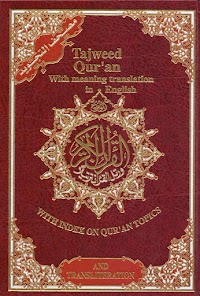Related Posts
- كتاب: Tajweed Quran with Meanings Translation and Transliteration in English=مصحف التجويد مع ترجمة المعاني إلى الإنجليزية (ملون)16 Jun 20183
عنوان الكتاب: Tajweed Quran with Meanings Translation and Transliteration in English=مصحف التجويد مع ترجمة المعاني إلى الإنجليزية (ملون)...Read more »
- كتاب: Taiweed Quran Miraculous Dual Verses on the Quranic Pages=مصحف التجويد مثاني إعجازية في الصفحات القرآنية (ملون)16 Jun 20182
عنوان الكتاب: Taiweed Quran Miraculous Dual Verses on the Quranic Pages=مصحف التجويد مثاني إعجازية في الصفحات القرآنية (ملون) المؤلف...Read more »
- كتاب: The Noble Qur’ân English Translation of the meanings and commentary=القرآن الكريم وترجمة معانيه إلى اللغة الإنكليزية (الإنجليزية)27 Feb 20180
عنوان الكتاب: The Noble Qur’ân English Translation of the meanings and commentary=القرآن الكريم وترجمة معانيه إلى اللغة الإنكليزية (الإنج...Read more »
- كتاب: The Noble Qur’ân English Translation of the meanings and commentary=القرآن الكريم وترجمة معانيه إلى اللغة الإنكليزية (الإنجليزية) (ملون)27 Feb 20182
عنوان الكتاب: The Noble Qur’ân English Translation of the meanings and commentary=القرآن الكريم وترجمة معانيه إلى اللغة الإنكليزية (الإنج...Read more »
- كتاب: textsThe Gracious Quran A Modern-Pharased Interpretation in English - Arabic-English Parallel Edition=ترجمة معاني القرآن الكريم إلى اللغة الإنكليزية27 Feb 20181
عنوان الكتاب: textsThe Gracious Quran A Modern-Pharased Interpretation in English - Arabic-English Parallel Edition=ترجمة معاني القرآن ال...Read more »
- The Quran15 Dec 20170
The Quran The Qur'an is the supreme authority in Islam. It is the fundamental and paramount source of the creed, rituals, ethics مؤلف الكتاب...Read more »









Post a Comment
EmoticonClick to see the code!
To insert emoticon you must added at least one space before the code.